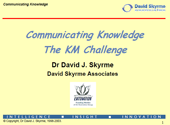Communities of Practice
A Community of Practice (CoP) is an informal knowledge network that transcends departmental boundaries. Indeed many companies use the term 'knowledge networks' to describe their communities. Since much of an organization's knowledge is tacit, CoPs represent one of the most effective ways to share and develop individuals' specialized knowledge. They are social learning environments focussed on a specific knowledge domain, such as sharing best practice in materials technology or planning for a specific new product launch.

Different Types of Community
There are many different types of community with different characteristics. These include:
- Networks and forums which rely on face-to-face meetings: professional special interest groups are an exmaple of such a (cross-organizational) community
- Virtual communities - where participants use email, online discussion forums and web-based tools to communicate; however, even these CoPs find it beneficial to have the occassional face-to-face meeting
- Communities of Interest (CoI) – a shared interest, often peripheral to an individual's main work
- Communities of Purpose) – usually a smaller task group that acts as a delivery network; it is typcially taked by senior management to meet a specific (usually time-limited) commitment
Whatever their form, most CoPs exhibit many of the following characteristics:
- they emerge around a problem or shared interest, often in an ad-hoc way
- they are multi-function and multi-disciplinary, to gain a range of perspectives
- they may do things in spite of the organization - many a senior manager has tried to close down communities claiming "they are a time waster and detract from a person's main work", whereas properly used they can do precisely the opposite
- activity will ebb and flow, depending on circumstances
- they focus on learning that arises through practice and real business needs (not theoretical)
- the community is self-governing, setting its own goals, membership boundaries, modus operandi etc.
Evolution of Communities
Observation of many CoPs show that they evolve through a series of stages:
- Emerging - there is an issue or opportunity that several people are interested in pursuing
- Embryonic - the ideas coalesce and the first few advocates start the ball rolling
- Establishing - the ground rules are created, interest is generated and facilities (e.g. online forum, website) provided
- Established - the community is effective but needs constant nurturing and sustaining, e.g. by effective mnoderation, injection of new ideas or specific tasks
- Evolving - the focus of the CoP shifts; it may amalgamate with other CoPs or more specialized interest groups may split off to create their own communities
- Extinct - the CoP is past its 'sell by' date; it may be remembered fondly for its achievements and sense of comradery, or may simply fade away into oblivion
The stages typically are not distinct. The important point is that each community needs different skills and coporate support at each stage of its development. During the early stages, this may be help and even resouces from a central KM team. When established it may require some formal link into particular lines of business or organizaitonal committees.
Developing Effective Communities
During over a decade of KM consulting we have identified the differences between effective and less effective communities. Our analysis of successful communities has identified four areas that need to be addressed:
- The business need - CoPs are generally more successful when they are focussed on a specific business need. This need not be something too specific but simply a domain of potentially useful knowledge. Generally something that is not time-critical provides a focus for an ongoing community
- People and processes - these are the most critical factors. Key here are the different roles needed for making the CoP effective on a day-to-day basis. Individuals must be allowed time to participate in relevant CoPs. In some knowledge-intensive organisations, Taking an active part in a specific CoP is part of the job description. The most crucial role for an online CoP is that of moderator. This person facilitates communications, keeps discussions on track and works behind the scenes with individuals to either encourage their contribution or dissuade them from inappropriate contributions.
- The KM dimension - how the community knowledge is organized and used. It is too easy just to have long threads of conversations. The best communities have 'knowledge editors' who distil the knowledge that the community creates into a more accessible form - such as an intranet protal or 'book of xyz knowledge'
- Technology - any kind of social networking technology can help, whether it is a discussion forum, a wiki or blog. Generally information will be partitioned into that which is open access to all, and that which is restricted to specific members. Again, it is not the technology per se that is the ultimate determinant of success (though it must be widely accessible and easy-to-use) but rather the way that it is used. Thus guidance, exemplars of good practice and good information structuring all play a part.
Since communities are social (as well as knowledge) networks, there is no set formula for ensuring success. So much depends on the organizational context and the people involved. However, have interpersonal skills and being sensitive to the needs fo community memebers and the organization at large are key foundations in almost every context.
A set of effective CoPs can reap tremendous benefits for an organization. We have seen examples of millions of dollars saved in product development (through coalescing of initially independent initiatives discovered through communities, or through early validation, or otherwise, of product ideas), acute problems in one part of the world successfully addressed by solutions that have been proven elsewhere, and of alerting senior management to business threats earlier than they would otherwise found out.
Further Reading
- Creating Successful Communities - a 35-page K-Guide by David Skyrme. To be updated and available through the K-Shop on this website later.
- Cultivating Communities of Practice by Etienne Wenger, Richard McDermott and William M. Snyder (Harvard Business School Press 2000). These three pioneers of CoPs give a thorough grounding with many examples, and a good set of notes.
Last updated: 19th March 2011


